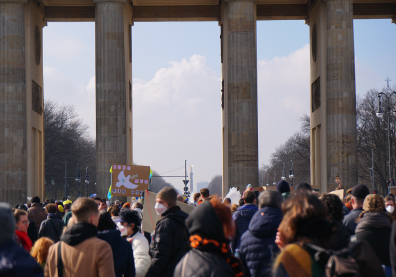Presentation of Riccardo Nicolosi's book Putins Kriegsrhetorik, in the presence of the author, followed by a round-table discussion.

Scientific event summary
The book presentation and round table conclude a collective research program begun in 2024 with a two-day workshop on contemporary Russian political concepts with the aim of establishing a differentiated mapping of political concepts in V. Putin's Russia. In particular, the project envisages the publication of a Dictionary of Contemporary Russian Political Concepts
Since the early 2000s, Russian political language, used by politicians, state officials and media, has undergone significant changes, reflecting the regime's gradual transformations from a fragile democracy to a fully autocratic regime. Russia's military invasion of Ukraine has accelerated and radicalized these processes, leading to the resemantization of old terms and the formation of new groups of concepts, such as those belonging to the field of biopolitics, for example.
Some of these ("democracy", "liberalism", "sovereignty") have a long history in Western countries. Others, more recent (such as "fake news"), gained popularity in other countries before being integrated into Russian political and media language. A significant number of key concepts ("state-civilization", "pentabasis", "passionality", "[social] ties", "Z") are unique to Russia, deriving from an ancient intellectual tradition or a more recent invention linked to new phenomena in political life. They must be studied not only in the light of the Russian political transformations of the last twenty years, but of the Russian, Soviet and post-Soviet intellectual heritage in a comparative perspective with other, mainly Western, traditions, the latter having had a strong impact on the development of the concepts used today in Russian political life.
An in-depth examination of these heterogeneous concepts, their origins and uses, distinct in Russia from those in France or Germany, requires a multidisciplinary approach and the use of varied methods of analysis. It is based firstly on a historical-genealogical analysis of the origins of the concepts, then on a comparison to identify the specific features they take on in Russia in relation to interpretations in other political traditions, notably France and Germany, and finally on epistemological and sociological instruments to identify the uses made of them in Russian political reality.
This research program is structured along three axes:
- Genesis of concepts and evolution of their meaning
- Political role and social impact of concepts
- International dynamics of concepts (transfers and appropriations).
Within the interdisciplinary research team we have set up, each member focuses on a particular aspect of each axis, according to their skills and scientific interests. Team members are also involved in writing articles for the Dictionnaire. The main aim of the initial workshop, held in Paris in November 2024, was to identify precisely each person's interests and skills, in order to best carry out this long-term collective work. A new meeting, scheduled for November 6, 2025, will open with the presentation of the work of group member Riccardo Nicolosi (discussant: Mischa Gabowitch, Johannes Gutenberg University Mainz) and will continue in the form of a round table designed to take stock of the preparation of the Dictionnaire and discuss the challenges posed by this project.
Scientific event program
2pm-3.30pm : Presentation, in English, of the book by Riccardo Nicolosi (LMU Munich) : Putins Kriegsrhetorik. Konstanz: Konstanz University Press 2025, in the presence of the author.
Discussant: Mischa Gabowitsch (Johannes-Gutenberg-Universität Mainz)
Summary of the book
Rhetoric as a weapon - Putin's speeches as a political tool.
The war against Ukraine was rhetorically prepared by Putin. He amplified and justified it with complex reasoning. The network of legitimizing strategies may seem strange and disturbing, but it responds in a targeted way to the expectations of a broad national and international public, and guarantees a widespread understanding of the Kremlin's positions. The Russian president is not, however, a charismatic or eloquent politician. Compared to his opponent Zelenski, his oratorical talents are far less developed. But Putin's words are at the root of all political communication strategies in today's Russia. It defines the framework of what can be said in politics.
Riccardo Nicolosi dissects Putin's war communication: from the parody of Western justifications for war to a paranoid causal logic in which Russia appears as the eternal victim of Western hegemonic aspirations; from the affective rhetoric of resentment to the mystification of the Second World War as a never-ending event; from the modeling of the Ukrainian conflict as an anti-colonial and tectonic upheaval of the global geopolitical order to the elevation of war as the only form of true existence in present and future Russia. Thus, the power of words legitimizes the martial use of force just as much as it makes war a plausible solution to all problems.
3.30pm-4.00pm: Coffee break
4pm-5.30pm: Round table with the participation of members of the working group* around the ongoing dictionary project: Routledge Companion to Concepts in Russian Contemporary Politics (ed. I. Podoroga, Yu. Sineokaya and A. Zhavoronkov)
- Sergei Akopov, Freie Universität Berlin, Political Science
Organization
- Ioulia Podoroga (CREE, Inalco)
- Carole Sigman (CERCEC, CNRS/EHESS)